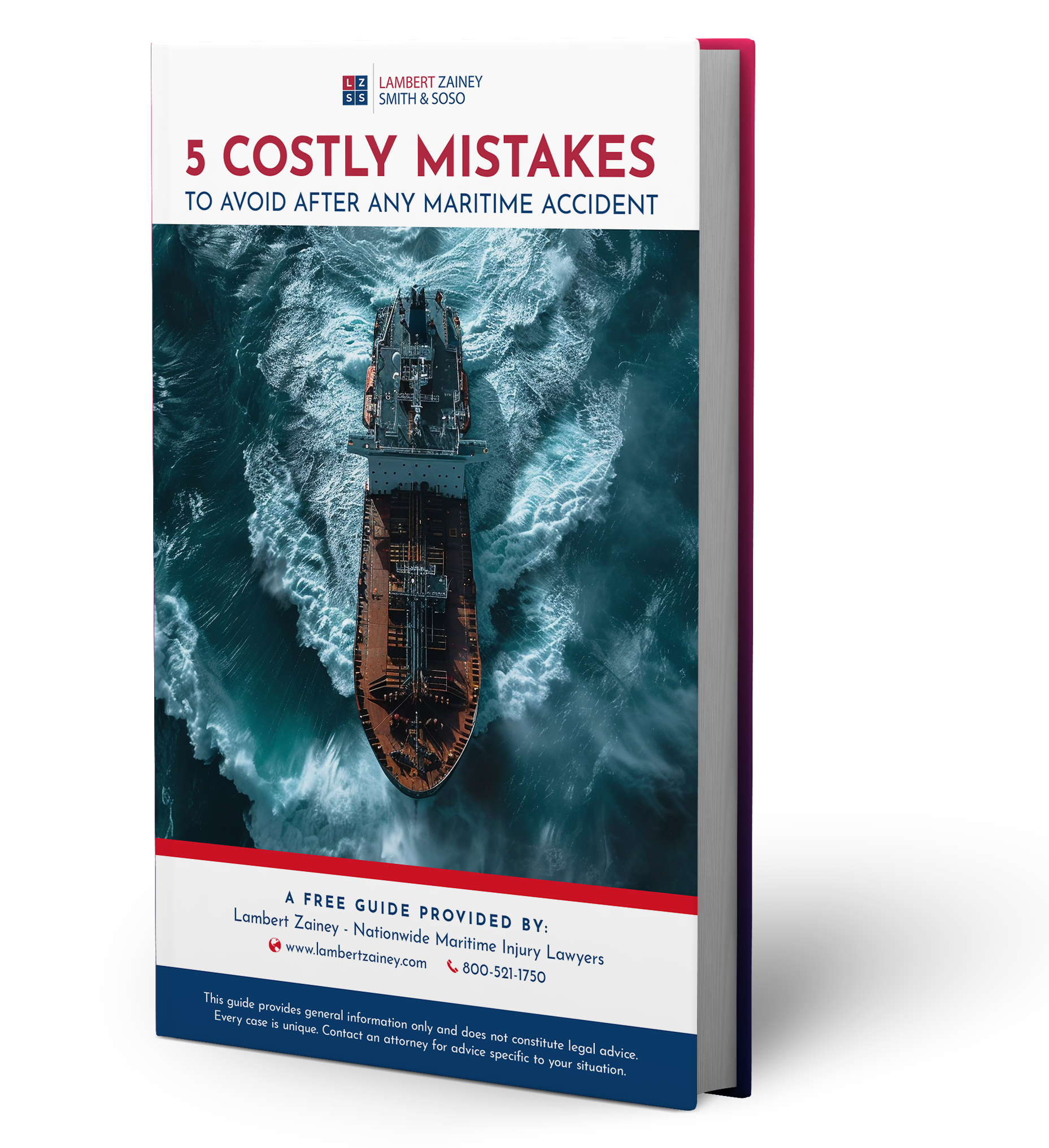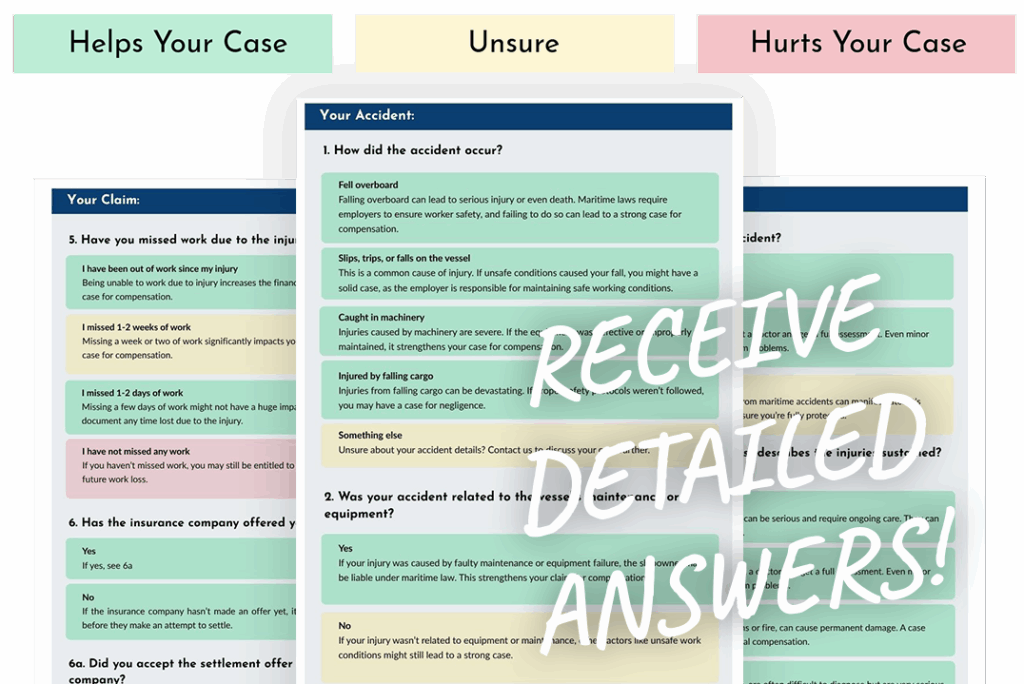The Jones Act protects the rights of eligible seamen who have suffered a work-related illness or injury. Among other things, it allows an injured seaman to seek compensation from their employer for any losses or damages resulting from injuries caused by negligence. Losses and damages can include:
However, there is a strict statute of limitations that applies to Jones Act lawsuits.

Statute of Limitations for Jones Act Lawsuits
A statute of limitation defines the period of time a plaintiff (the injured party) has to file a claim. For Jones Act lawsuits, the statute of limitations is three years from the date the injury took place or three years from the date the seaman discovered they were injured. Seamen who wait longer than three years risk having their case thrown out of court.
Who Qualifies for Protection Under The Jones Act?
In addition to meeting the three-year deadline, there are other requirements for filing a Jones Act lawsuit. One of the most important is qualifying as a “seaman” under the Jones Act.
Not all maritime workers are protected by the Jones Act. Only those who meet the legal qualifications for being a seaman. The Jones Act defines a seaman as someone who spends at least 30 percent of their work time contributing to the mission and purpose of a “vessel in navigation.” This includes a vessel’s masters, captains, officers, and crew members.
A vessel can be a cruise ship, tugboat, fishing boat, tanker, freighter, container vessel, a supply ship, etc. A vessel in navigation is one that is afloat, operational, and capable of moving on navigable waters. Navigable waters include not only the oceans of the U.S. Coast (the Atlantic Ocean, Pacific Ocean, Gulf of Mexico) but also navigable inland waterways such as lakes and rivers.
How Does The Jones Act Protect Injured Seamen?
Under the Jones Act, employers are required to provide a reasonably safe work environment for seamen. When they fail to do so and a seaman becomes injured, an employer can be held liable for any damages resulting from these injuries. Unsafe conditions onboard a vessel can include:
Maritime injuries can be severe and even fatal:
The Jones Act Process
There are many actions an injured seaman needs to take immediately following their accident to protect their Jones Act rights. First, and most importantly, they need to notify their employer that they’ve been injured immediately after the accident. Under federal law, any work-related injury must be reported within seven days of the accident.
Next, the injured seaman has to fill out a company accident form. They must be careful when completing the form; an error could hurt their case. It’s important to note that the accident form is the only paperwork you should complete. Do not agree to or sign any other documents requested by your employer or their insurance adjuster before speaking to an attorney.
The injured seaman needs to seek medical treatment for their injuries, even if it means being evacuated off a vessel. Medical records are crucial for establishing the extent of a seaman’s injuries.
Finally, they need to speak with an experienced New Orleans Jones Act attorney. Jones Act lawsuits are more complex than other types of personal injury claims. In order for an employer to be liable, the injured seaman must be able to show that the negligent or wrongful conduct of their employers was to blame for their injuries and subsequent losses. To get the best outcome, you need an attorney with extensive experience in maritime law.
Get Our FREE Guide to Protect Your Claim
What you do after an accident is critical. Insurance companies will try to get you to make mistakes that can hurt your claim. Our free guide can help you avoid these traps.
Download our complimentary guide: “5 Costly Mistakes to Avoid After Any Maritime Accident” to arm yourself with the knowledge you need to protect your rights.
Speak To A Nationwide Jones Act Lawyer About Your Accident
The law firm of Lambert Zainey Smith & Soso has been protecting the rights of seamen and other injured maritime workers since 1977. Our team of highly skilled and experienced Jones Act attorneys have recovered over a billion dollars in settlements for our clients.
The sooner you seek legal representation after your accident, the better off you will be. Call us today at (800) 521-1750 or contact us through our website to schedule a free initial consultation with a maritime attorney. We’re headquartered in New Orleans and represent clients from all over the country.
The Jones Act protects the rights of eligible seamen who have suffered a work-related illness or injury. Among other things, it allows an injured seaman to seek compensation from their employer for any losses or damages resulting from injuries caused by negligence. Losses and damages can include:
However, there is a strict statute of limitations that applies to Jones Act lawsuits.

Statute of Limitations for Jones Act Lawsuits
A statute of limitation defines the period of time a plaintiff (the injured party) has to file a claim. For Jones Act lawsuits, the statute of limitations is three years from the date the injury took place or three years from the date the seaman discovered they were injured. Seamen who wait longer than three years risk having their case thrown out of court.
Who Qualifies for Protection Under The Jones Act?
In addition to meeting the three-year deadline, there are other requirements for filing a Jones Act lawsuit. One of the most important is qualifying as a “seaman” under the Jones Act.
Not all maritime workers are protected by the Jones Act. Only those who meet the legal qualifications for being a seaman. The Jones Act defines a seaman as someone who spends at least 30 percent of their work time contributing to the mission and purpose of a “vessel in navigation.” This includes a vessel’s masters, captains, officers, and crew members.
A vessel can be a cruise ship, tugboat, fishing boat, tanker, freighter, container vessel, a supply ship, etc. A vessel in navigation is one that is afloat, operational, and capable of moving on navigable waters. Navigable waters include not only the oceans of the U.S. Coast (the Atlantic Ocean, Pacific Ocean, Gulf of Mexico) but also navigable inland waterways such as lakes and rivers.
How Does The Jones Act Protect Injured Seamen?
Under the Jones Act, employers are required to provide a reasonably safe work environment for seamen. When they fail to do so and a seaman becomes injured, an employer can be held liable for any damages resulting from these injuries. Unsafe conditions onboard a vessel can include:
Maritime injuries can be severe and even fatal:
The Jones Act Process
There are many actions an injured seaman needs to take immediately following their accident to protect their Jones Act rights. First, and most importantly, they need to notify their employer that they’ve been injured immediately after the accident. Under federal law, any work-related injury must be reported within seven days of the accident.
Next, the injured seaman has to fill out a company accident form. They must be careful when completing the form; an error could hurt their case. It’s important to note that the accident form is the only paperwork you should complete. Do not agree to or sign any other documents requested by your employer or their insurance adjuster before speaking to an attorney.
The injured seaman needs to seek medical treatment for their injuries, even if it means being evacuated off a vessel. Medical records are crucial for establishing the extent of a seaman’s injuries.
Finally, they need to speak with an experienced New Orleans Jones Act attorney. Jones Act lawsuits are more complex than other types of personal injury claims. In order for an employer to be liable, the injured seaman must be able to show that the negligent or wrongful conduct of their employers was to blame for their injuries and subsequent losses. To get the best outcome, you need an attorney with extensive experience in maritime law.
Get Our FREE Guide to Protect Your Claim
What you do after an accident is critical. Insurance companies will try to get you to make mistakes that can hurt your claim. Our free guide can help you avoid these traps.
Download our complimentary guide: “5 Costly Mistakes to Avoid After Any Maritime Accident” to arm yourself with the knowledge you need to protect your rights.
Speak To A Nationwide Jones Act Lawyer About Your Accident
The law firm of Lambert Zainey Smith & Soso has been protecting the rights of seamen and other injured maritime workers since 1977. Our team of highly skilled and experienced Jones Act attorneys have recovered over a billion dollars in settlements for our clients.
The sooner you seek legal representation after your accident, the better off you will be. Call us today at (800) 521-1750 or contact us through our website to schedule a free initial consultation with a maritime attorney. We’re headquartered in New Orleans and represent clients from all over the country.









